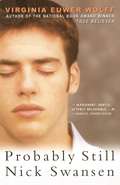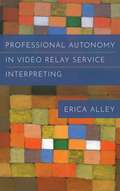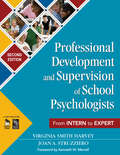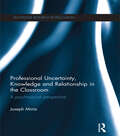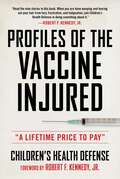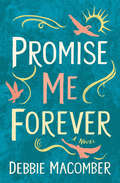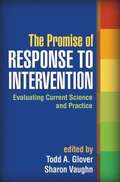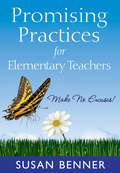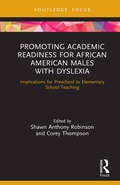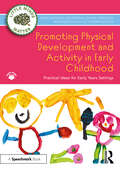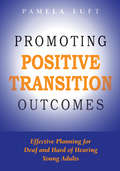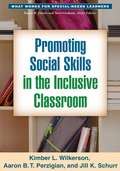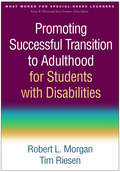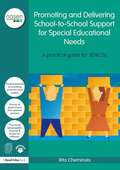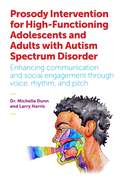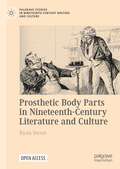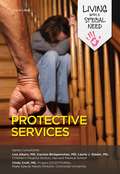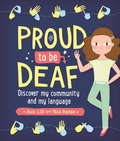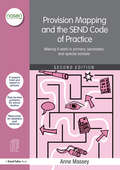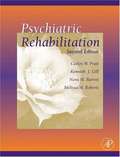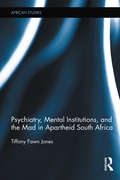- Table View
- List View
Probably Still Nick Swanson
by Virginia Euwer WolffSixteen-year-old learning-disabled Nick struggles to endure a life in which the other kids make fun of him, he has to take special classes, his date for the prom makes an excuse not to go with him, and he is haunted by the memory of his older sister, who drowned while he was watching.
Professional Autonomy in Video Relay Service Interpreting (Gallaudet Studies In Interpret #17)
by Erica AlleyVideo relay service (VRS) is a federally funded service that provides telecommunications access for deaf people. It is also a for-profit industry with guidelines that may limit the autonomy of the sign language interpreters who work in VRS settings. In this volume, Erica Alley examines how VRS interpreters, or “Communication Assistants,” exercise professional autonomy despite the constraints that arise from rules and regulations established by federal agencies and corporate entities. Through interviews with VRS interpreters, Alley reveals the balance they must achieve in providing effective customer service while meeting the quantitative measures of success imposed by their employer in a highly structured call center environment. Alley considers the question of how VRS fits into the professional field of interpreting, and discovers that—regardless of the profit-focused mentality of VRS providers—interpreters make decisions with the goal of creating quality customer service experiences for deaf consumers, even if it means “breaking the rules.” Her findings shed light on the decision-making process of interpreters and how their actions are governed by principles of self-care, care for colleagues, and concern for the quality of services provided. Professional Autonomy in Video Relay Service Interpreting is essential reading in interpreter education courses and interpreter training programs.
Professional Development and Supervision of School Psychologists: From Intern to Expert
by Virginia Smith Harvey Joan A. StruzzieroEssential for fostering the professional development and enhanced competency of school psychologists, this book discusses administrative and clinical supervision and offers vignettes, assessment tools, and methods for evaluating professional growth.
Professional Uncertainty, Knowledge and Relationship in the Classroom: A psychosocial perspective (Routledge Research in Education)
by Joseph MintzThe extent to which teachers should make use of theoretical and expert knowledge as opposed to tacit experiential knowledge, and how these might be combined, is a perennial issue in discussions on pedagogy. This book addresses these debates through a creative development of the concept of productive uncertainty.Using case studies focusing on teachers working with children with autism, a particularly fertile crucible for considering uncertainty, the book explores how the radical 20th century psychoanalyst Wilfred Bion's epistemological approach to uncertainty can be used to re-frame Donald Schön's concept of reflection in action, offering a new perspective on the practice of teachers and other caring professionals. Several areas of potential uncertainty are identified, including uncertainty relating to areas of practice including diagnosis, the relationship between expert knowledge and practice, the implications of autism for autonomy and agency, and uncertainties in relation to the understanding of and use of new technologies. A strong argument is made, based on both theoretical and empirical grounds, that in juggling between theoretical and tacit knowledge in the classroom there is more to be gained by staying with the struggle with uncertainty than by fleeing from it too early, into the promise of expert solutions. Consideration is also given to the relative importance of specific theoretical training for teachers, both in general and in relation to working with children with special educational needs, in the context of international and UK policy developments in this area.This book will be of key value to researchers and postgraduates in the fields of education studies, teacher thinking and research, psychoanalytically informed psychosocial studies, as well as to practitioners working in special educational needs/autism education.
Profiles of the Vaccine-Injured: "A Lifetime Price to Pay" (Children’s Health Defense)
by Robert F. Kennedy Jr. Children's Health DefenseAre vaccine injuries really &“one in a million,&” as governments and public health experts constantly tell us? This comprehensive look at the evidence by Children&’s Health Defense, illustrated by nine real-life stories of serious vaccine injury, exposes health agencies&’ soft-pedaling of vaccine risks as a dangerous lie. For most people, the potential risks of vaccination, which include life-changing illness, family bankruptcy, and even death, are invisible and almost inconceivable—until a vaccine injury happens to them. Through the poignant and riveting stories of nine injured children and adults, Profiles of the Vaccine-Injured by Children&’s Health Defense communicates the devastating impacts of vaccine damage on health, family finances, relationships, and more. As the book&’s introductory chapters show, vaccine injuries—whether from a routine childhood injection—or a travel vaccine—or a COVID-19 shot—are common, not rare. Discussing US children&’s poor showing in global health rankings, the book assembles compelling evidence pointing to childhood vaccination as a key &“elephant in the room.&” The heart of the book resides in the vaccine injury stories told by mothers of injured children and injured adults. Conveying in vivid detail what it&’s like to live with conditions such as severe autism, chronic pain, and immune systems gone haywire, the nine individuals also attest to the disturbing fact that &“when it comes to vaccine injuries, there&’s no help legally or financially—you&’re on your own.&” In addition, they share affecting accounts of gaslighting, a lack of answers or solutions and outright hostility from the medical community, social isolation, heavy financial burdens, and interrupted careers and lives. Exposing the truth behind the vaccine safety myth, Profiles of the Vaccine-Injured makes vaccine injury personal and demonstrates that we ignore vaccine risks at our peril.
Program Planning and Evaluation for Blind and Visually Impaired Students: National Guidelines for Educational Excellence
by Kathleen Mary Huebner Jack HazekampThe guidelines have been developed as a resource for parents, staff, and administrators in identifying and assessing the unique needs of visually impaired students and planning, providing, evaluating, and improving the quality and cost-effectiveness of programs serving these students.
Promise Me Forever: A Novel (Debbie Macomber Classics)
by Debbie MacomberRomance between a man paralyzed in an accident and his physical therapist.
Promise of Response to Intervention
by Sharon Vaughn Todd GloverAs response to intervention (RTI) is adopted by increasing numbers of schools and districts, knowledge about "what works" continues to grow. This much-needed book analyzes the key components of RTI service delivery and identifies the characteristics of successful implementation. Critically reviewing the available research, leading authorities describe best practices in multi-tier intervention, assessment, and data-based decision making. Clear-cut recommendations are provided for implementing evidence-based interventions to support students' needs in reading, writing, math, and behavior. A state-of-the-art resource for K 12 practitioners and administrators, the book also will fill a unique niche in graduate-level courses.
Promising Practices for Elementary Teachers: Make No Excuses!
by Susan M. BennerProven strategies to put struggling students on the path to success! This book offers educators much-needed tools to break the cycle of failure for students who are unsuccessful in school. With vignettes and reflective practice scenarios and questions, this book provides: Strategies for parental involvement, multi-tiered instruction, peer learning models, and universal design for learning Approaches for fostering student success before a child is referred to special education Practices and programs that address the needs of at-risk populations, including English language learners, children living in poverty, and learners with disabilities Interventions and positive support for learners with behavioral challenges
Promoting Academic Readiness for African American Males with Dyslexia: Implications for Preschool to Elementary School Teaching (Routledge Research in Educational Equality and Diversity)
by Shawn Anthony Robinson Corey ThompsonThis timely book tackles underlying issues that see disproportionate numbers of African American males with dyslexia undiagnosed, untreated, and falling behind their peers in terms of literacy achievement. Considering factors including dialectic linguistic difference, limited phonological awareness, and the intersectionality of gender, language, and race, the studies included in this volume illustrate how classroom practices at preschool and elementary levels are failing to support students at risk of reading and writing difficulties. Promoting Academic Readiness for African American Males with Dyslexia shows that it is possible to provide every girl and boy, and particularly African American boys with effective support and appropriate interventions enabling them to read at a level that is conducive to ongoing academic performance and success. This, argue the authors of this volume, is vital to the social, emotional, moral, and intellectual development of our society. This edited volume was originally published as a special issue of Reading & Writing Quarterly: Overcoming Learning Difficulties. It will be of great interest to graduate and postgraduate students, researchers, and academics in the field of African-American Education, Educational Equity, Race studies, Multiple learning difficulties and Literacy development.
Promoting Physical Development and Activity in Early Childhood: Practical Ideas for Early Years Settings (Little Minds Matter)
by Jackie Musgrave Lucy Rodriguez Leon Jane Dorrian Joanne Josephidou Ben LangdownGetting young children active and supporting their physical development right from the start is essential for children’s all-round development and good health. However, children’s levels of physical activity are declining. This book helps readers increase their understanding to support young children’s overall development, health, and wellbeing.Breaking current physical activity guidelines into bite-size chunks, the book provides key advice on caring for and educating babies and young children on how to meet the recommended amount of physical activity each day. Current research is accessibly explored, including links with screen time and neuroscience, and informs a range of flexible, open-ended activities and practical strategies to use in every early years setting. Chapters include: Suggestions on planning an enabling environment to support young children’s physical development without expensive equipment or classes. Steps for making physical activity inclusive for all children, including those with special educational needs and physical conditions. Key research translated into easy-to-understand, informative guidance. The voice of the child and the importance of listening to children woven throughout. Opportunities for readers to assess how their own setting supports physical activity. The importance of early physical development to communication and future academic performance. Grounded in best practice for supporting physical development in the early years and working with parents, this book is essential reading for trainee and practising early years educators, as well as parents and carers of young children.
Promoting Positive Behaviour
by Sharon PaleyIf you work with people with a learning disability or people with autistic spectrum condition and are studying for a health and social care qualification, or you want the right information to help your personal development, then Promoting positive behaviour is for you. This book puts the person at the centre of the support you give. It uses real life stories, activities and thinking points to cover all of the learning outcomes and is full of practical examples of how to apply the ideas to the support you provide.
Promoting Positive Transition Outcomes: Effective Planning for Deaf and Hard of Hearing Young Adults
by Pamela LuftMany students struggle with the transition from high school to the next stage of their lives. For deaf and hard of hearing (DHH) students, that struggle can be intensified by barriers and discriminatory attitudes they face in their communities, schools, and workplaces. Though much progress has been made, they are often underemployed and underpaid, and they receive postsecondary training at lower rates than other disability groups. Author Pamela Luft explores the reasons for these statistics and offers strategies and resources that can improve outcomes. Promoting Positive Transition Outcomes is the most comprehensive discussion of transition planning and results for DHH students now available. Luft begins with an overview of the historical and current challenges to DHH students and their academic and vocational potential. She explores the importance of forming an identity and building foundational social and problem-solving skills. She then reviews the history of rehabilitation and workforce legislation, which now mandates that every student with an individualized education plan (IEP) have a transition plan in place by the age of 16. Most schools, however, are not equipped to meet the needs of a population as diverse as DHH students. She examines the services that are currently available in high schools and offers recommendations for strengthening transition team planning by reaching out to external experts. The volume concludes with suggestions for creating a framework to address the challenges of transition planning for deaf and hard of hearing students and offers guidance on building effective plans.
Promoting Social Skills in the Inclusive Classroom
by Jill K. Schurr Aaron B. Perzigian Kimber L. WilkersonThis indispensable book presents evidence-based tools and strategies for improving the social skills of all members of the inclusive classroom (K-6), especially students experiencing difficulties in this area. The authors explain why social competence is critical to school success and describe interventions, curricula, and instructional approaches that have been shown to be effective at the schoolwide, classroom, and individual levels. Procedures for conducting assessments and developing individualized intervention plans are detailed. Reproducible forms can be downloaded and printed in a convenient 8 1/2" x 11" size.
Promoting Successful Transition to Adulthood for Students with Disabilities (What Works for Special-Needs Learners)
by Tim Riesen Robert L. MorganComprehensively addressing the challenges of transition, this book provides practical knowledge and tools geared toward real-world educators. It presents clear guidelines for all aspects of team-based transition planning for individuals with various levels of disability, illustrated with vignettes of three secondary students who are followed throughout the book. The authors describe evidence-based practices for conducting assessments and promoting optimal outcomes in the areas of employment, postsecondary education, and independent living. Keys to family involvement, self-determination, interagency collaboration, and problem solving are highlighted. Several reproducible forms can be downloaded and printed in a convenient 8 1/2" x 11" size.
Promoting and Delivering School-to-School Support for Special Educational Needs: A practical guide for SENCOs (nasen spotlight)
by Rita CheminaisRecent changes to education policy have brought about a new emphasis on promoting school-to-school support and school-led improvement, in order to ensure that all pupils, including those with SEN, achieve their optimum potential. SENCOs, often in the role of Specialist Leaders of Education (SLE), now undertake coaching, mentoring and the delivery of training to ensure that trainee, newly qualified and experienced teachers and teaching assistants have the practical skills to effectively meet the needs of pupils with SEN. In her trademark down-to-earth style, Rita Cheminais shows SENCOs how to respond to and enhance this exciting and pivotal new role by: Explaining the new school-to-school support and school-led improvement context that many SENCOs will be working in; Clarifying the role of the outstanding SENCO, as a Specialist Leader of Education; Maximising on the best practice arising from the effective use of the pupil premium and the ‘Achievement for All’ initiative; Confirming OFSTED’s expectations for SEND in the revised inspection schedule for schools and academies; Describing how best to monitor, evaluate and validate best practice in school-to-school support. Packed with time-saving, photocopiable resources, examples of best practice and further activities for reflection, this practical book will enable the SENCO to respond to the current agenda, particularly in performing the role of a Specialist Leader of Education, disseminating SEN expertise across schools. Promoting and Delivering School-to-School Support for Special Educational Needs will be essential reading for all outstanding and aspiring outstanding SENCOs working in the early years, primary, secondary and special phases of education, academies and Pupil Referral Units.
Prosody Intervention for High-Functioning Adolescents and Adults with Autism Spectrum Disorder: Enhancing communication and social engagement through voice, rhythm, and pitch
by Michelle Dunn Larry Harris Julia DunnProviding lessons for prosody intervention in high-functioning adolescents and young adults with Autism Spectrum Disorder (ASD), this book helps to develop verbal and nonverbal skills to aid their transition into adulthood through a program of evidence-based lessons and resources. The authors offer a complete curriculum of lessons taking student from self-calming to fluency and conversational skills and thereby enhancing their communication skills and conversational competence, skills that are essential for the ability to get on in adult life, for example in the context of looking for a job. The curriculum includes lesson plans, handouts and homework, and builds on some of the characteristic traits of high-functioning autism, for example by setting up sets of rules for clarity. The program has been successfully used by the authors in their work with people on the autism spectrum and will be a life-changing resource for professionals as well as for parents and people on the autism spectrum wanting to improve their ability to communicate well.
Prosthetic Body Parts in Nineteenth-Century Literature and Culture (Palgrave Studies in Nineteenth-Century Writing and Culture)
by Ryan SweetThis open access book investigates imaginaries of artificial limbs, eyes, hair, and teeth in British and American literary and cultural sources from the nineteenth and early twentieth century. Prosthetic Body Parts in Nineteenth-Century Literature and Culture shows how depictions of prostheses complicated the contemporary bodily status quo, which increasingly demanded an appearance of physical wholeness. Revealing how representations of the prostheticized body were inflected significantly by factors such as social class, gender, and age, Prosthetic Body Parts in Nineteenth-Century Literature and Culture argues that nineteenth-century prosthesis narratives, though presented in a predominantly ableist and sometimes disablist manner, challenged the dominance of physical completeness as they questioned the logic of prostheticization or presented non-normative subjects in threateningly powerful ways. Considering texts by authors including Charles Dickens, Edgar Allan Poe, and Arthur Conan Doyle alongside various cultural, medical, and commercial materials, this book provides an important reappraisal of historical attitudes to not only prostheses but also concepts of physical normalcy and difference.
Protective Services
by Joyce LibalNot every child is lucky enough to live in a safe, loving home. Many young people live in difficult, unhealthy, or even dangerous conditions. Luckily, there are systems in place to help kids caught in theses situations. Child protective services are working hard to help children in need. Ryan Delaney is one of these kids. He spends most of his time living in a fantasy world, because that's easier than facing his real life. He lies to his friends about his parents and his home--but eventually, the truth catches up with him, forcing him to get the help he needs. As you read Ryan's story, you will learn about the history of the child protective services and find out about the programs and services offered today.
Proud to be Deaf
by Ava Beese Lilli Beese Nick BeeseA wonderful child-led book that celebrates Deaf culture and introduces readers to British Sign LanguageMarvellously positive and encouraging throughout, this would be a useful addition to any primary school or public library, as well as being useful to help any child understand a little more about their deaf peers. - The CarouselAva is like any other 7-year-old. She likes to talk and laugh with her friends, is obsessed with dogs and loves being active. Ava is also deaf - and she's proud of it. She loves her deaf community, that she's bilingual, and that she experiences the world differently from hearing people. In this book, Ava welcomes her hearing peers to her daily life, the way technology helps her navigate the world and explains common misconceptions about deaf people - and introduces some of her deaf heroes who have achieved amazing things. She talks about her experiences at school making friends with hearing children, and teaches readers the BSL alphabet and some BSL phrases. Featuring photos of Ava, her friends and family throughout, plus illustrations of hand signs, this book celebrates deafness rather than discussing 'overcoming challenges' or 'stigma'. Perfect for readers aged 5 and upwards.
Provision Mapping and the SEND Code of Practice: Making it work in primary, secondary and special schools (nasen spotlight)
by Anne MasseyIn the busy world that schools inhabit, this book provides clear guidance on how to implement a simple and user-friendly system that will ensure all pupil progress is forensically examined and any inadequacies swiftly addressed. Provision Mapping and the SEND Code of Practice describes a tried and tested system that helps schools to successfully identify, implement and track provision for all pupils, irrespective of whether they have a special educational need or not. This new edition: demonstrates how schools can implement the requirements of the new SEND Code of Practice provides achievable solutions to the problems that schools face in trying to evidence the impact of the additional support they provide provides photocopiable templates of tables that can be used to track progress of all pupils contains easy to use tools that will allow a school to clearly evidence that additional funding is used efficiently. This second edition has been fully updated to reflect the recent changes to SEN legislation, the new SEND Code of Practice (2015), the new National Curriculum and new assessment requirements and the new Common Inspection Framework. Additional material has been added to provide a resource for secondary and special schools. Headteachers, senior managers, leadership teams, SENCOs and other educational professionals will find the guidance and support provided by this book invaluable.
Psychiatric Rehabilitation (2nd edition)
by Carlos W. Pratt Kenneth J. Gill Nora M. Barrett Melissa M. RobertsPsychiatric rehabilitation refers to community treatment of people with mental disorders. Community treatment has recently become far more widespread due to deinstitutionalization at government facilities.
Psychiatric Rehabilitation: A Psychiatric Handbook for Practitioners
by Lynda J. KatzTextbook on mental illness
Psychiatric and Behavioral Disorders in Intellectual and Developmental Disabilities
by Nick Bouras Hemmings, Colin and Bouras, Nick Colin HemmingsFully revised, this new edition reviews the most up-to-date and clinically relevant information on the mental health and behavioral problems of people with intellectual, developmental and learning disabilities, also previously known as mental retardation. Providing the latest evidence base from the literature and embracing clinical experience, it covers the essential facts and concepts relating to coexisting medical and psychiatric disorders, with new and updated chapters on mental health and epilepsy, schizophrenia spectrum disorders, personality disorders, and mental health problems in people with autism and related disorders. The disorder-based chapters are complemented by chapters on carer and family perspectives, possible future developments and contributions highlighting the principles of assessment, management and services from global and historical perspectives. This is essential hands-on practical advice for psychiatrists, psychologists and all other mental health professionals including nurses, therapists, social workers, managers, service providers and commissioners.
Psychiatry, Mental Institutions, and the Mad in Apartheid South Africa (African Studies)
by Tiffany Fawn JonesIn the late 1970s, South African mental institutions were plagued with scandals about human rights abuse, and psychiatric practitioners were accused of being agents of the apartheid state. Between 1939 and 1994, some psychiatric practitioners supported the mandate of the racist and heteropatriarchal government and most mental patients were treated abysmally. However, unlike studies worldwide that show that women, homosexuals and minorities were institutionalized in far higher numbers than heterosexual men, Psychiatry, Mental Institutions and the Mad in Apartheid South Africa reveals how in South Africa, per capita, white heterosexual males made up the majority of patients in state institutions. The book therefore challenges the monolithic and omnipotent view of the apartheid government and its mental health policy. While not contesting the belief that human rights abuses occurred within South Africa’s mental health system, Tiffany Fawn Jones argues that the disparity among practitioners and the fluidity of their beliefs, along with the disjointed mental health infrastructure, diffused state control. More importantly, the book shows how patients were also, to a limited extent, able to challenge the constraints of their institutionalization. This volume places the discussions of South Africa’s mental institutions in an international context, highlighting the role that international organizations, such as the Church of Scientology, and political events such as the gay rights movement and the Cold War also played in shaping mental health policy in South Africa.
